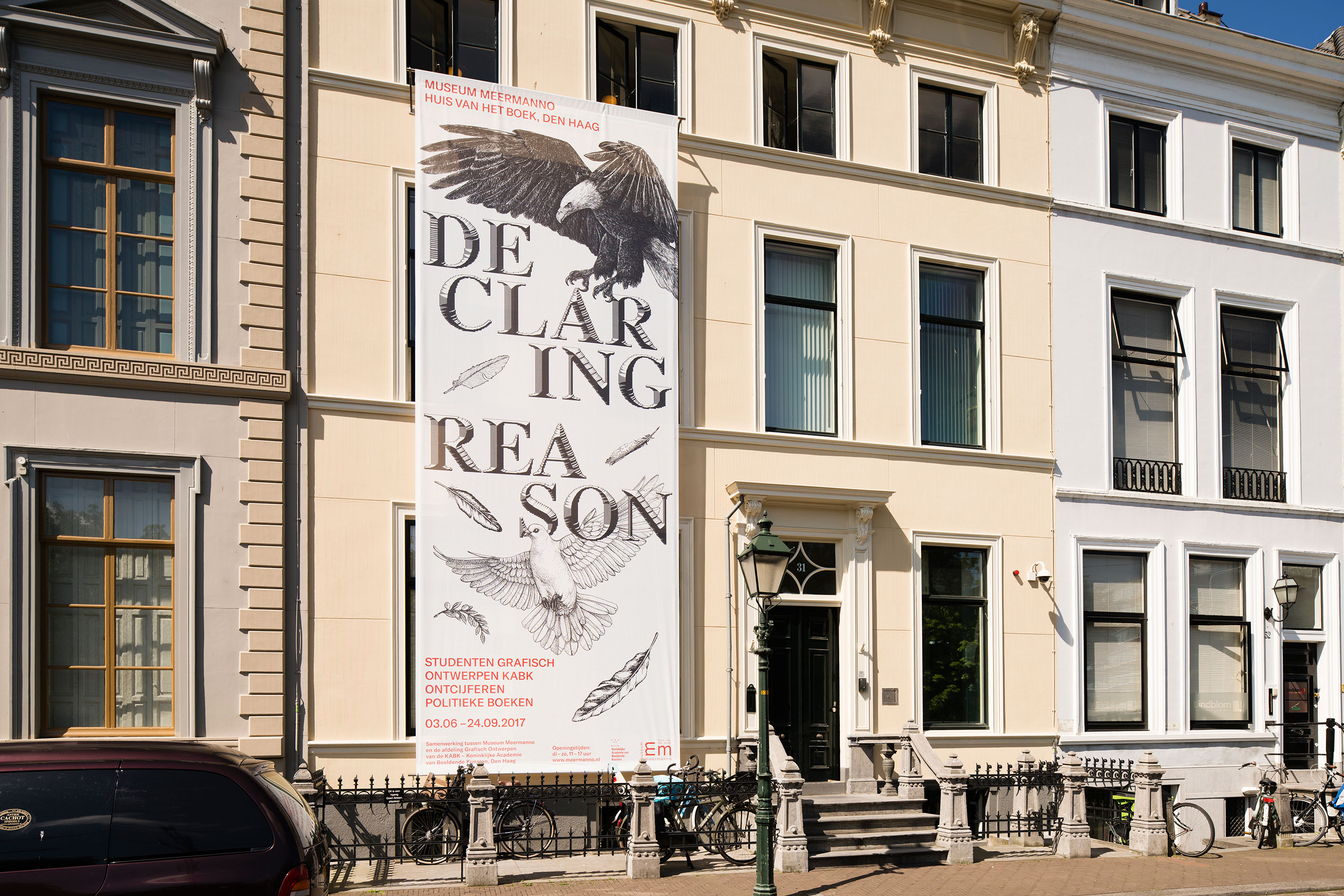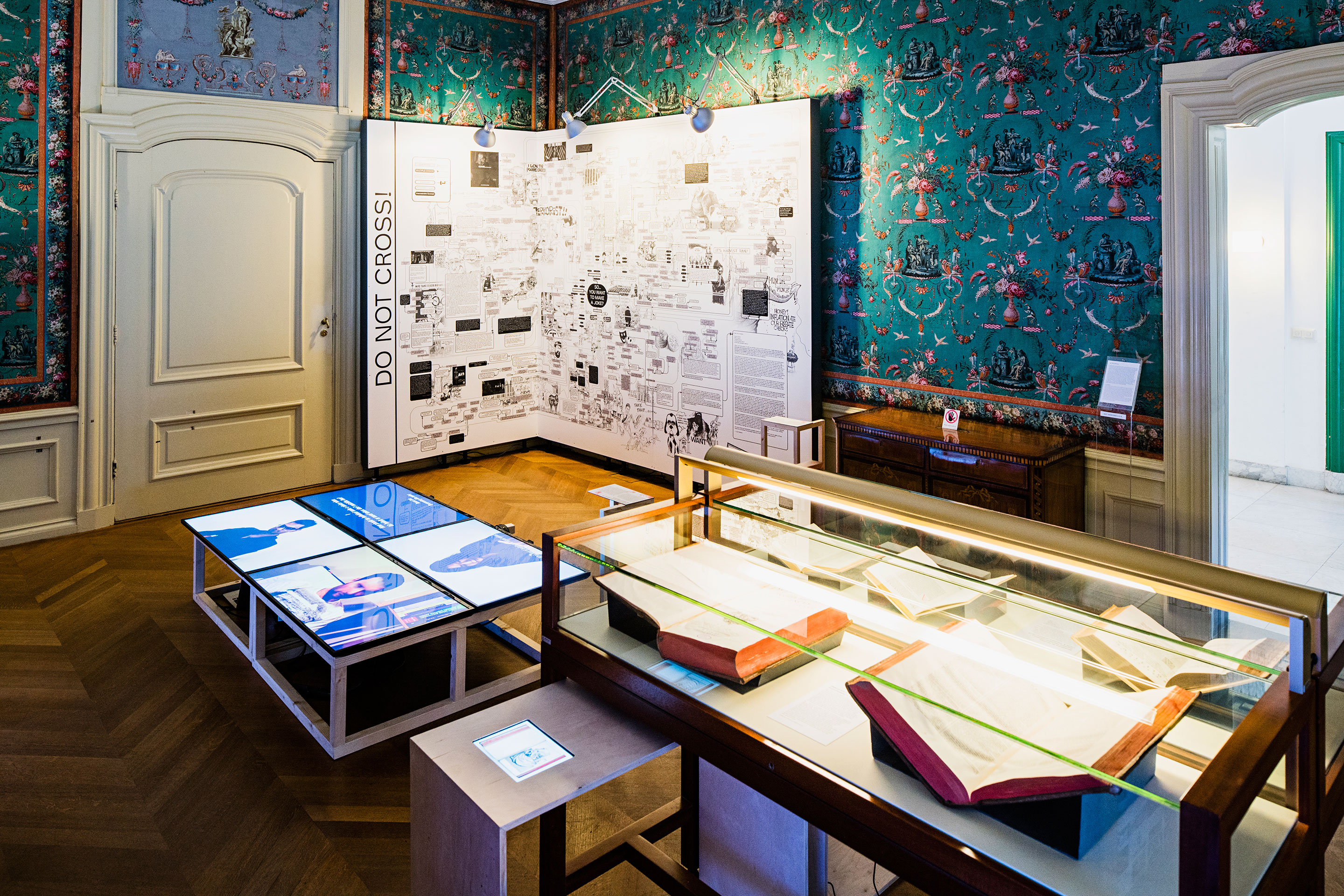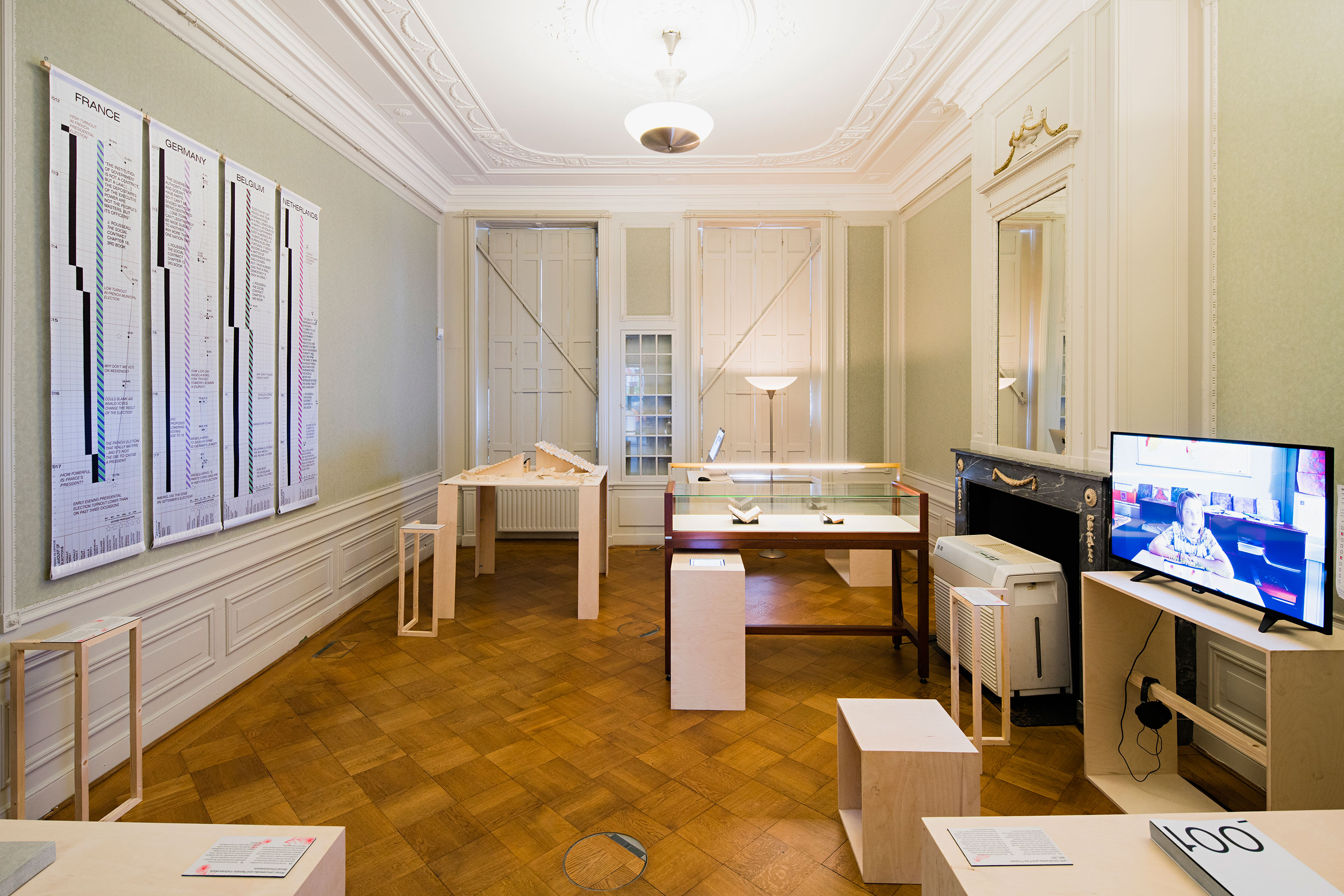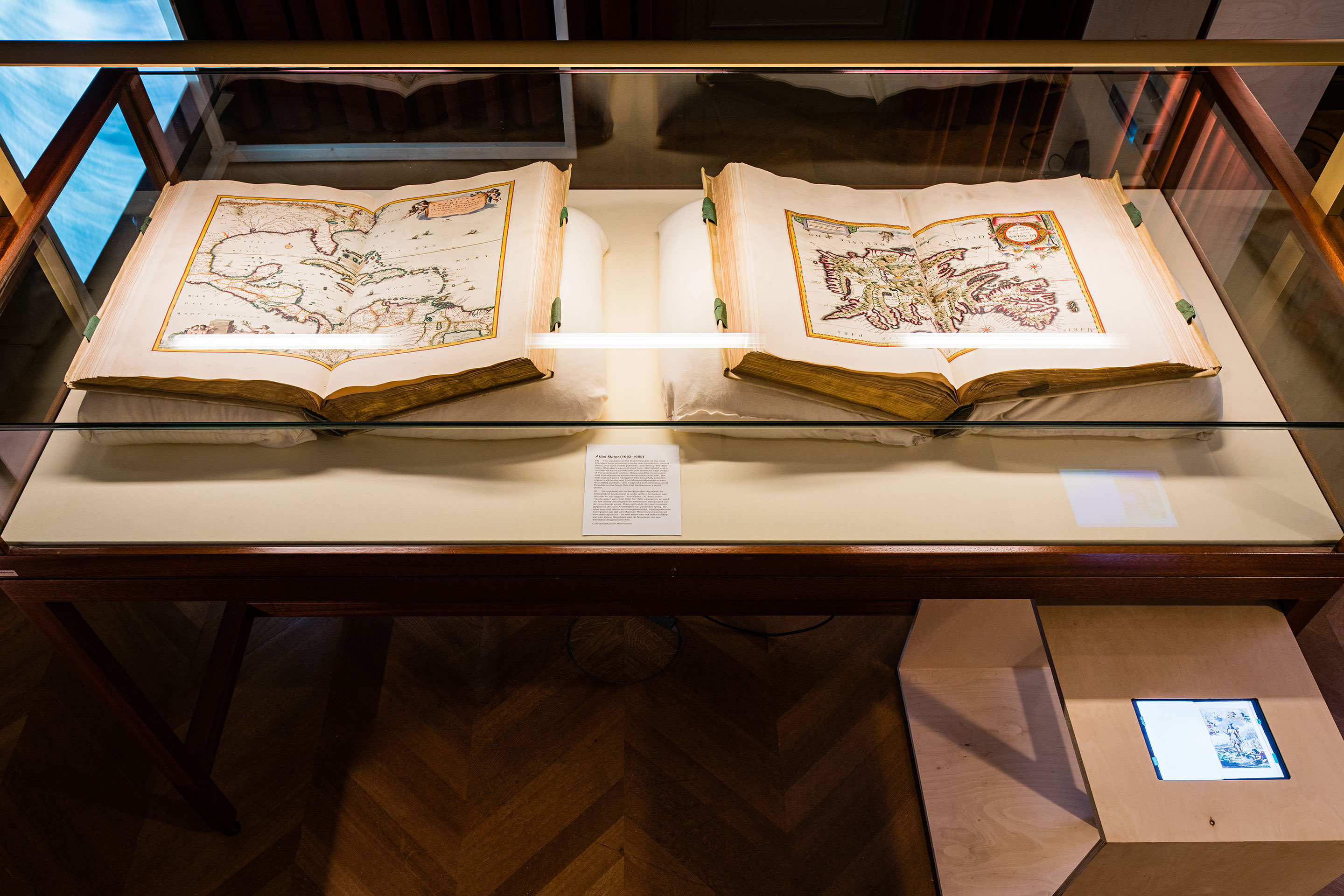Declaring Reason
Imposed Arguments of Political Books
August 10, 2017artist contribution,
Declaring Reason is a collaboration between Museum Meermanno and the KABK – Royal Academy of Arts in the Hague that presents the works of third-year Graphic Design students who investigate the history of parliamentary democracy by means of books and manuscripts from Museum Meermanno’s collection. The exhibition juxtaposes books from the museum’s historical collection with innovative new impressions by students, and is on show for the public from 3 June until 24 September 2017. Declaring Reason was tutored by Niels Schrader and Lauren Alexander from the Royal Academy of Arts and included theory component tutoring by Maarten Cornel. Guest critics were Alice Twemlow and Olivier Arcioli.




Democracy holds a precarious position in times of post-truth politics, because when facts don’t matter and sensation rules, how can democracy possibly survive? In the 2017 elections for the House of Representatives in the Netherlands, France and Germany, the European Union is subject to unprecedented challenges that threaten its very existence. This seems reason enough for a young generation to explore concepts of governance and understand the democratic legacy of our predecessors.
For Declaring Reason each Graphic Design student group selected one book from a pre-curated collection of political books that form the backbone of this exhibition. Books reviewed include Atlas Maior (1662–1665) by Johannes Blaeu, Tractatus Theologico-Politicus (1670) by Spinoza, Encyclopédie (1751–1772) by Denis Diderot and Jean le Rond d’Alembert, Social Contract (1762) by Jean Jacques Rousseau, Aan het Volk van Nederland – To the People of the Netherlands (1781) by Joan Derk van der Capellen tot den Pol and the 1814 Dutch constitution. Each of the selected books has shaped our understanding of democracy in a particular way.
The core objective of Declaring Reason was to contextualize seventeenth- and eighteenth-century Enlightenment period publications by understanding their historical relevance and connecting them to contemporary political scenarios. The students’ task was to use the text and context of given books as inspiration to derive personal, yet well researched reflections and bring their findings to life as interactive, audio-visual and textual exhibition pieces. The results of this unique partnership are presented as an exhibition that showcases twenty-three projects, many of which critically reflect on our current democratic system, by highlighting its historical origins and how we could possibly reconnect with its core values amidst current times of democratic despair.
The Graphic Design department at the KABK is very excited to collaborate with Museum Meermanno and witness our students engage with rare, historical, yet relevant material. We believe that graphic design studies in particular should critically engage with the way media distributes and impacts political information and messages. We encourage students to question currently used media platforms, to think beyond surface interfaces, to understand the mechanics, agendas and power structures at play behind the everyday tools that we all use. We are very pleased to witness how students have come to realize that the philosophical thoughts and societal critique of thinkers like Spinoza, Rousseau and Diderot are still applicable to the social confusion and class inequalities that exist today.
The exhibition title, Declaring Reason refers to political reasonings that have formed the foundation of representative democracy. Learning how to debate, formulate a position and defend a particular argument have been the cornerstones of this long-term research project. Graphic design and political texts are both concerned with the communication and manifestation of ideas, which thereby make visible a critical voice in our society. It has been a valuable exercise for students to contextualize democracy by understanding its role in different historical frameworks. Declaring Reason projects give us hope that an upcoming generation of designers will be increasingly engaged with democracy by formulating opinions and aspirations concerning ideals such as freedom, responsibility and justice.
Participating students: Matyáš Bartoň, Hilde Barwegen, Nóra Békés, Leith Benkhedda, Kylièn Bergh, Paul Bille, Antonia Brell, Thijmen van Brunschot, Kiki Coster, Rudi van Delden, Niels van der Donk, Carmen Dusmet Carrasco, Vanessa Eck, Jan Egbers, Lukas Engelhardt, Elizaveta Glukhova, Michiel Heemskerk, Daniel Hernández Chacón, Saber Javanmard, Rebecca Joly, Ies de Jong, Daan Kars, Dóra Kerekes, Rik Laging, Iris Lam, Jungeun Lee, Anna Lenczewska, Zuzanna Loch, Andréas van der Mast, Kay Pisarowitz, Paw Poulsen, Taisiia Reshetnik, Guillaume Roux, Rebecca Rui, Josephine van Schendel, Theresa Scherrer, Marika Seo, Asya Sukhorukova, Lou Top, Lin Ven, Natalia Vishnevskaia and Wannes Vrijs.
A selection of the projects is shown here.
List of Projects
- Hilde Barwegen, Counterfeit Knighthood
- Nóra Békés & Wannes Vrijs, Happiness on Sale
- Antonia Brell & Rebecca Rui, Democratic Constructs
- Rudi van Delden & Jan Egbers, An Overtaken Future
- Vanessa Eck & Rebecca Joly, Reconstructing Power
- Elizaveta Glukhova & Jungeun Lee, The Frame of Singularity
- Daniel Hernández & Dóra Kerekes, Changing Paradigms
- Saber Javanmard, God / Devil is in the Details
- Iris Lam & Lou Top, 5th Grade
- Anna Lenczewska & Natalia Vishnevskaia, Social Environments
- Kay Pisarowitz & Marika Seo, Do Not Cross!
- Taisiia Reshetnik & Theresa Scherrer, EU Coherence
- Asya Sukhorukova & Lin Ven, Declaring Word
Niels Schrader (1977, Caracas, VE) is a concept-driven information designer with a fascination for numbers and data. He is founder of the Amsterdam-based design studio Mind Design and member of the AGI – Alliance Graphique Internationale. Next to his design practice Schrader has been lecturing at the Delft University of Technology, ArtEZ – Academy of Art & Design in Arnhem and Willem de Kooning Academie in Rotterdam. Since January 2013 he is co-head of the Graphic Design department at the Royal Academy of Art in The Hague. In his work, Schrader plays the role of both a mediator and a designer. He considers communication to be an interactive process that requires participation through questioning. See further: www.minddesign.info.
Lauren Alexander (1983, ZA) is a designer and artist. She teaches in BA and MA Graphic Design at the Royal Academy of Art, The Hague (KABK) and in 2019 she was a member of the KABK Research Group chaired by Alice Twemlow. Her collaboration with designer Ghalia Elsrakbi (1978, SY) initiated in 2009 has informed her practice and teaching. As Foundland Collective Lauren and Ghalia explore under-represented political and historical narratives by working with archives via art, design, writing, educational formats, video making and storytelling. The duo critically reflects upon what it means to produce politically engaged work from their position as non-Western artists working between Europe and the Middle East. Foundland Collective was awarded the Smithsonian Artist Research Fellowship for research in the largest Arab American archive in 2015, the outcome of which was presented as a video installation at Centre Pompidou in Paris (2017) and their short video, ‘The New World, Episode One’ premiered at the Rotterdam Film Festival (2018). The duo have lectured and exhibited internationally including at ISPC, New York, Ars Electronica, Linz, Fikra Biennial, Sharjah and Tashweesh Feminist Festival, Cairo and Brussels. Their work has been shortlisted for the Dutch Prix de Rome in 2015 and Dutch Design Awards in 2016.